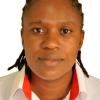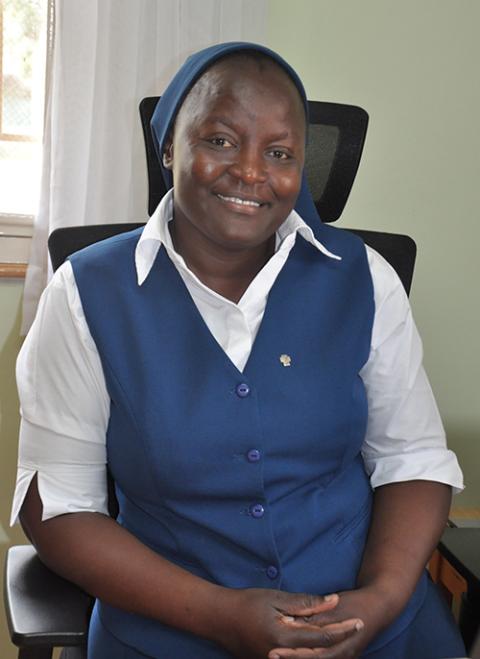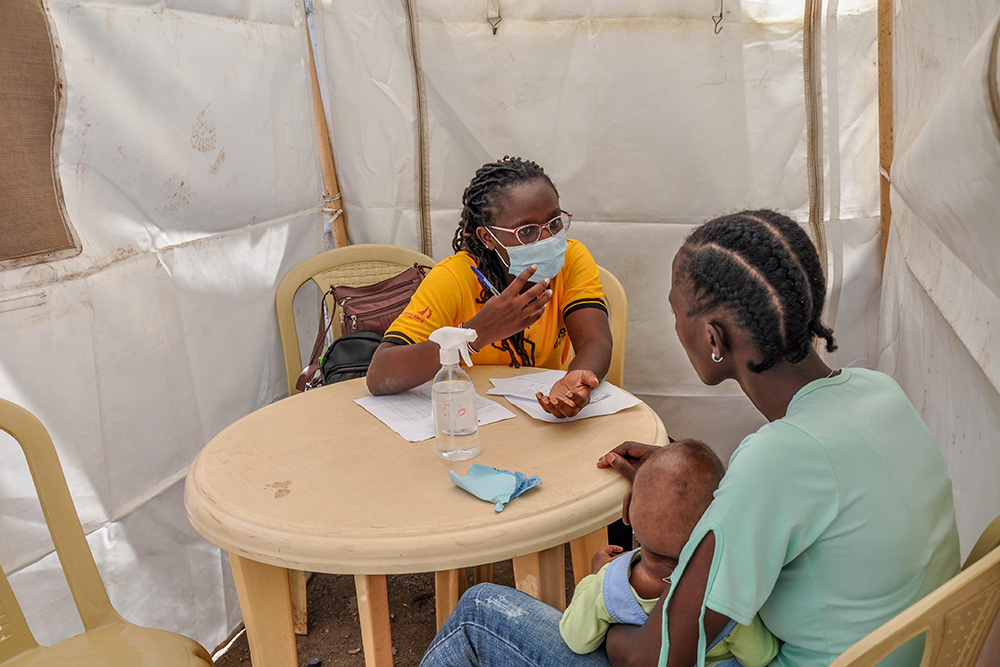
Dr. Susan Navucha, a medical officer at the DREAM Center in Lang'ata, Nairobi, Kenya, meets a client on Dec. 1, 2023. (Lourine Oluoch)
Every day, Hilda Shile, a mentor at the DREAM Center in the Lang'ata suburb of Nairobi, makes calls to about 14 people, reminding them to take their medication. She also goes through a list, reminding those with upcoming appointments to keep them and contacting those with missed appointments to find out why they hadn't come to the clinic.
"I have those who take drugs at 7 a.m., 8 a.m., six in the morning. I call them and motivate them. We also mentor those who have turned HIV-positive and support them. The calling works. When I call to remind you to take the medicine and you actually take it, you will suppress the virus in three months, and we should be able to see the difference," Shile said.
Shile is one of the six community health volunteers at the DREAM (Drug Resource Enhancement against AIDS and Malnutrition) Center in Lang'ata, Nairobi. The facility was established in 2008 by the Daughters of Charity of St. Vincent de Paul and offers holistic care, testing, education and treatment services for people living with HIV/AIDS.
Currently, the center offers free care to 3,215 from across Kenya and beyond, but mostly from Nairobi.
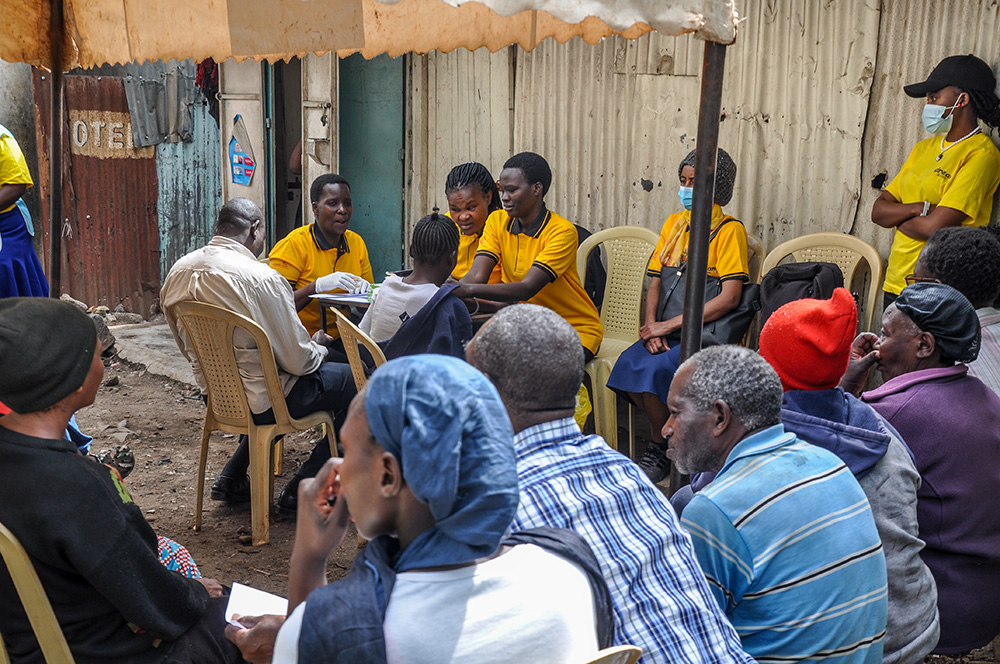
Members of the public line up for services from the DREAM Center during World Aids Day in Southlands, Lang'ata, Nairobi, Kenya, on Dec. 1, 2023. (Lourine Oluoch)
"Some clients come to the center after referrals from clinics, pharmacies, hospitals and dispensaries, others see the signboard and come in, and sometimes a client brings a friend. We also work with village elders, like on the last World Aids Day when we did outreach in Southlands, Lang'ata. The staff here also sell the organization well," said Sr. Irene Mercy Okumu, director at the DREAM Center.
"Our entry point is at the Voluntary Counseling and Testing center (VCT) where we get patients who want to know their status," Dr. Susan Navucha, medical officer at the facility, told Global Sisters Report.
After testing positive, they are sent to the counselors who will do a treatment preparation, explain the different types of medication they are going on, how to take them and their side effects, and also journey with them for six months to a year, especially for those suffering from stigma.
Over the years, the DREAM team has had a huge success. "Out of the 3,215, we have a viral uptake of 98% with a viral load suppression of 96%, which means that almost all the clients are responding well to treatment. The defaulting rate is less than 5%, and we are having a missed appointment rate of less than 5% and interruption in treatment of less than 1%," said Stephen Simiyu Wamalwa, the program monitoring and evaluation officer at DREAM.
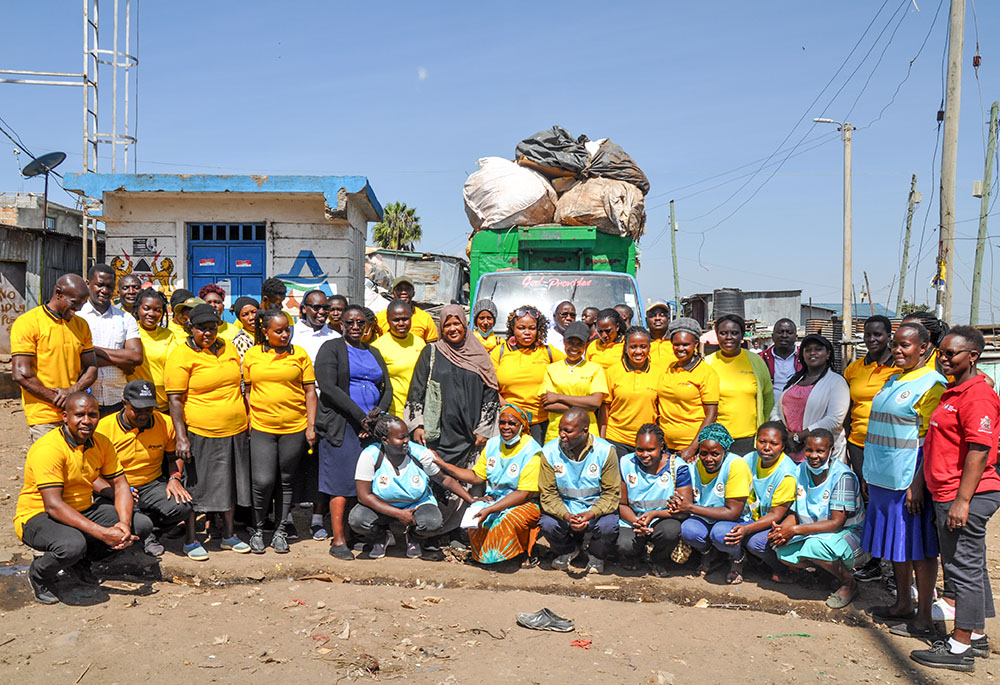
The team from the DREAM Center, were joined by community health workers during medical outreach at Southlands, Lang'ata, Nairobi, Kenya. (Lourine Oluoch)
He added that treatment preparation "is so robust that a client wouldn't default unless something happens along the way."
Okumu also noted that strong peer support groups at the center also help the patient along.
Monica Auma, a community health worker, does defaulter tracing for tuberculosis and HIV clients. She finds it easy because she lives within the community, and the people know her. However, some clients stop taking the TB and HIV medication. They test positive and are convinced to start medication, but then they start getting better and forget to take the medication.
"This is where I come in and encourage you to take the medication because if you stop, you will fall sick again because your immunity curve will be very low, and it can't resist any disease coming from outside," she said.
Robert Mbaya, the TB coordinator at the DREAM Center, stresses that it is important to treat TB because it is an opportunistic disease that takes advantage of the compromised immunity of the HIV-positive, and the patient is without protection.
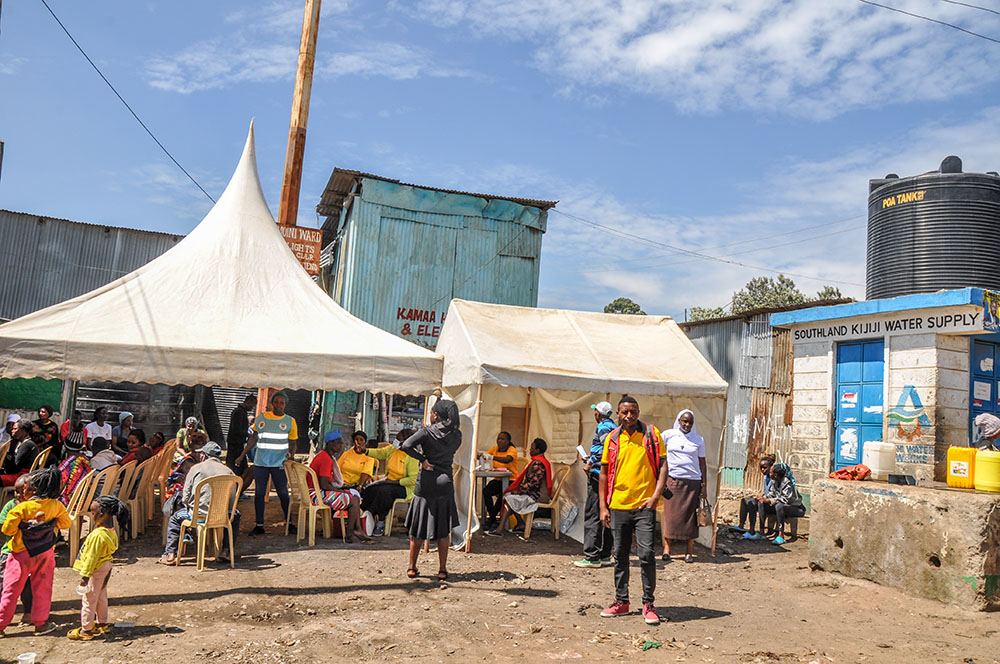
The DREAM Center pitched tents for medical outreach during World Aids Day in Southlands, Lang'ata, Nairobi, Kenya. Outreach includes tuberculosis screening; HIV testing; treatment for noncommunicable diseases like hypertension, diabetes and asthma; and screening for domestic violence. (Lourine Oluoch)
"We sensitize the community about TB because many patients have the censored symptoms of TB. We screen for free, and the treatment is also free. If clients are not treated for TB, the HIV clients who live with them are going to be infected," he said.
As Kenya journeys toward elimination of HIV/AIDS in children by 2027, the Dream Centre has had huge successes with the prevention of mother-to-child transmission of HIV.
"Here at DREAM, we are lucky that it's been many years of zero transmission. I have seen God working with us and the children, and we are grateful because maternal transmission is something we can avoid," said Sr. Susan Tanui, triage nurse and head of Prevention of Mother to Child Transmission (PMTCT) at the facility.
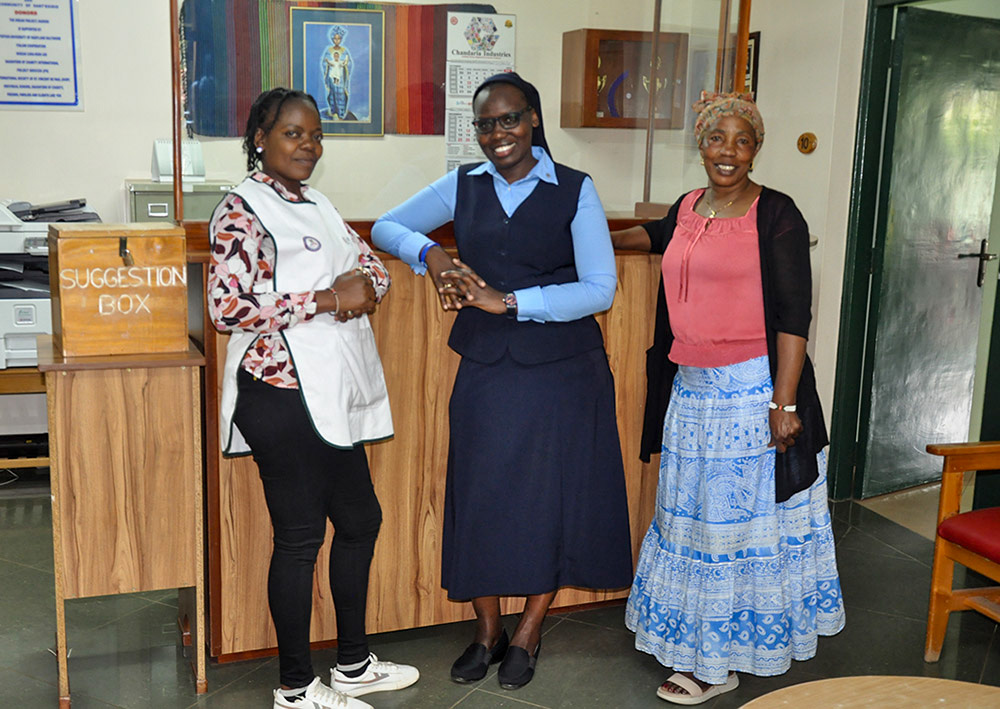
Daughter of Charity Sr. Susan Tanui, with Grace Khasandi and Margaret Nekesa, staff members at the DREAM Center, Lang'ata, Nairobi, Kenya. Every day, mentors from the center make calls to clients who need reminders to take their medication and attend appointments. (Lourine Oluoch)
Tanui journeys with HIV-positive mothers from the time they say they are pregnant to delivery and then journeys with the baby for two years before the child can be declared HIV-free. "We speak to them about the importance of viral load suppression so that we prevent their babies from transmission."
She works with mentor mothers who have successfully given birth to HIV-negative children and gives the mothers the practicalities and experiences of adherence to prevention methods.
Anne Wasike (name changed to protect her privacy), a mentor mother, explained, "I am a good example to them because I have lived positively. I have been HIV-positive since 2009. At that time, I didn't have any children. I visited the DREAM Center when I was three months expecting and went through all the adherence of PMTCT sessions. I managed to carry my pregnancy up to nine months, and my firstborn was negative.
Advertisement
"I tell them I have the experience, and some want to know how it happened, if it is easy, how my kids are and if I have tried having another child after that one. I tell them it's OK because now I have three babies who are negative. I encourage them to come and follow everything that the nurse advises them to do, which will lead to their babies turning negative."
Tanui said that, at every visit, all the clients are screened for gender-based violence, depression or stress. She explained that mothers often get postpartum depression due to financial or psychosocial issues, lack of family support or food, and stigma and rejection.
"We need to know because these things affect adherence, and clients struggling with social issues who have not disclosed their status have difficulty in being consistent with timing in drugs," Tanui said.
She added that they also offer pre-exposure prophylaxis if their partners are negative for prevention of transmission.
According to Okumu, the youth are most likely to default as they tend to try to hide their medication from their friends. During holidays, support groups and training are available to make sure they are taking their medication.
"We have a group of 40 youth who were born with HIV. They are at that age where they are in college and want relationships, a girlfriend or a boyfriend. When you sit with them, one of the topics that comes up is relationships, and how do I tell the other person that I am HIV positive and still keep them?"
Navucha noted that although the prevalence is still high, especially among the youth, gains have been made in the fight against HIV/AIDS in Kenya due to early detection.
"There is medication available, and the pill burden has gone down from 10 a day to only one. In the past, someone would come to the hospital advanced at stage three, and getting them back to normal was not easy. When we start the diagnosis early and do the counseling, the progression of the disease is not as bad as it was in the earlier days," she said.
Although mainly an HIV program, the DREAM Center integrates other services, including treatment of noncommunicable diseases like hypertension, diabetes and asthma; cervical cancer and TB screening; antenatal and child welfare clinics; and nutrition services to their clients for free.
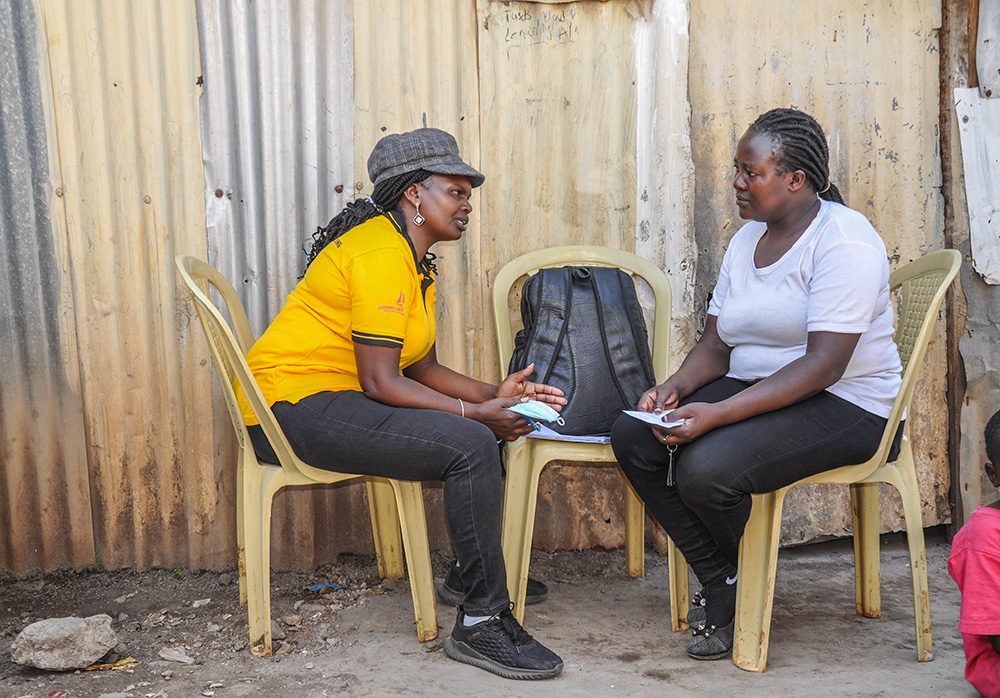
Esther Munyao of the DREAM Center guides a client, Linet Kaetano, through general counseling during a medical outreach at Southlands, Lang'ata, Nairobi, Kenya. (Lourine Oluoch)
The facility is supported by several stakeholders, primarily the government of Kenya through the Ministry of Health, which provides the primary tools, registers, reporting systems, antiretroviral (ARV) HIV drugs and more.
Other supporters include PEPFAR through CIHEB Kenya under Project Connect; Misean Cara, which supports the laboratory, some diagnostics and treatment; and the Daughters of Charity, Trocaire and the DREAM Center.
According to Tanui, the presence of the three religious sisters at the facility makes a whole difference in the service provision.
"As Daughters of Charity, we have a mission, values and guidelines that our staff need to live: respect, justice, excellence, hope and compassion. We want our staff to know and share our charism, and we treat our clients with respect and love. The poor are our masters, and we are their servants, and we have to see the face of Christ and contemplate Christ in their lives every day," Tanui said.
